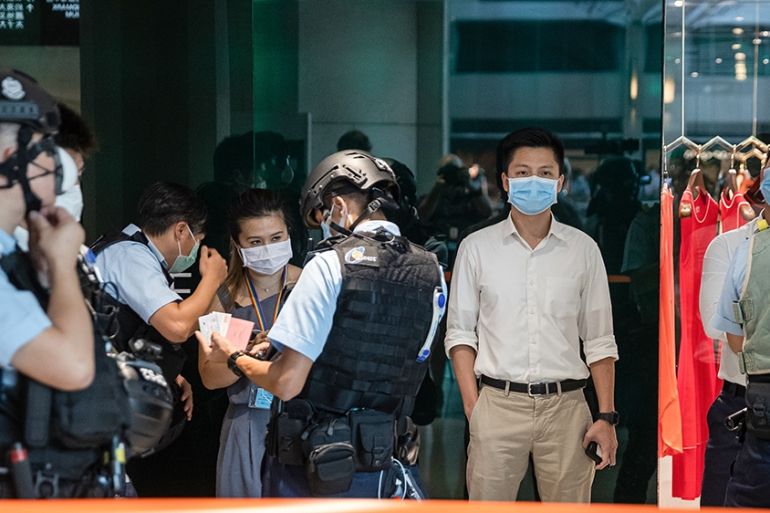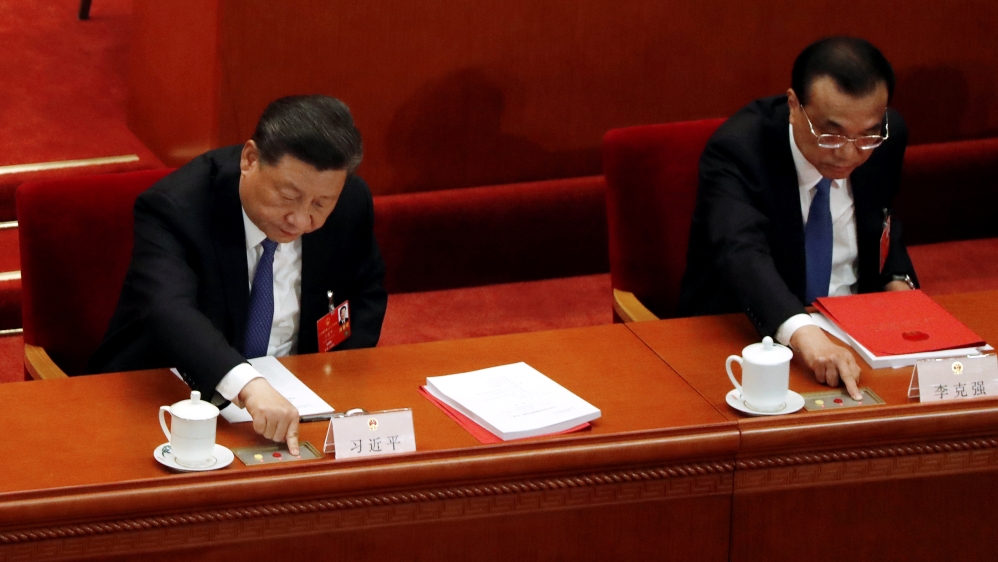World reacts to China’s national security law for Hong Kong
Japan expresses dismay as EU ‘deplores’ passage of new law, prompting China to denounce interference in its affairs.

China’s enactment of a national security law for Hong Kong has triggered concern overseas and a firm defence at home.
China says the law is necessary to deal with separatism and foreign interference in the semi-autonomous territory, but critics say it will outlaw dissent and destroy the autonomy promised when Britain handed the territory to Beijing in 1997 under a “one country, two systems” framework.
Keep reading
list of 4 itemsThe Take: Where are Hong Kong’s protesters now?
Hong Kong’s new security law comes into force amid human rights concerns
Hong Kong passes tough new national security law
Here’s a roundup of reactions to the law’s passage.
Japan
“It is regrettable that the national security law was enacted despite strong concerns shared among the international society and the people of Hong Kong,” Japanese Foreign Minister Toshimitsu Motegi said.
“It will undermine trust for the principle of ‘one country, two systems.’ “
United Kingdom
“We will be looking at the law very carefully and we will want to scrutinize it properly to understand whether it is in conflict with the Joint Declaration between the UK. and China. We will be setting out our response in due course,” Prime Minister Boris Johnson said.
China has chosen to break their promises to the people of Hong Kong and go against their obligations to the international community.
🇬🇧 will not turn our backs on the commitments we have made to the people of Hong Kong. pic.twitter.com/ir19ghzq28
— Dominic Raab (@DominicRaab) June 30, 2020
“China has chosen to break their promises to the people of Hong Kong and go against their obligations to the international community. The UK will not turn our backs on the commitments we have made to the people of Hong Kong,” Foreign Secretary Dominic Raab wrote on Twitter.
He added that Britain is raising the issue at the UN Human Rights Council.
|
|
United States
Secretary of State Mike Pompeo described the legislation as “draconian” which would “end free Hong Kong” in a tweet late on Tuesday.
The CCP’s draconian national security law ends free Hong Kong and exposes the Party’s greatest fear: the free will and free thinking of its own people.
— Secretary Pompeo (@SecPompeo) June 30, 2020
“The purpose of this brutal, sweeping law is to frighten, intimidate and suppress Hong Kongers who are peacefully demanding the freedoms that were promised,” House Speaker Nancy Pelosi said.
“We continue to urge President Trump to hold Chinese officials accountable for their abuses including in Hong Kong by deploying sanctions under the 2016 Magnitsky Act and by taking steps under the Hong Kong Human Rights and Democracy Act. … We must consider all tools available, including visa limitations and economic penalties.”
European Union
“This law risks seriously undermining the high degree of autonomy of Hong Kong and having a detrimental effect on the independence of the judiciary and the rule of law,” said European Council President Charles Michel. “We deplore this decision.”
Ursula von der Leyen, president of the European Commission, said: “We have indeed consistently said that China would risk very negative consequences if it went ahead with this law, including for business confidence, China’s reputation, public perception in Hong Kong and internationally.
“We remain in touch with our international partners on this matter and will pay careful attention to how to respond.”
Hong Kong
“It will only target an extremely small minority of people who have breached the law, while the life and property, basic rights and freedoms of the overwhelming majority of Hong Kong residents will be protected,” Hong Kong leader Carrie Lam said.
“The legislation will not undermine ‘one country, two systems’ and Hong Kong’s high degree of autonomy.”

Mainland China
“This issue is purely China’s internal affairs, and no foreign country has the right to interfere,” foreign ministry spokesperson Zhao Lijian said.
“The Chinese government is unswervingly determined to safeguard the interests of national sovereignty, security and development, to implement the ‘one country, two systems’ policy, and to oppose any external force interfering in Hong Kong affairs.”
Taiwan
“China promised that Hong Kong would remain unchanged for 50 years. The adoption of the National Security Law makes people feel that this commitment is indeed a blow to public confidence,” Taiwanese President Tsai Ing-wen said.
“We are disappointed that China cannot fulfill its commitments, which also proves that the ‘one country, two systems’ is not feasible.”
Joint statement by 27 countries at UN Human Rights Council
Twenty-seven countries including Britain, France, Germany and Japan said China must reconsider the law which “undermines” Hong Kong’s freedoms.
The 27 countries have “deep and growing concerns” over the new security law, which has clear implications on the human rights of people in Hong Kong, the statement said.
Imposing the law without the direct participation of Hong Kong’s people, legislature or judiciary “undermines” the ‘One Country, Two Systems’ principle guaranteeing Hong Kong a high degree of autonomy, rights and freedoms, said the signatories, which included Australia, Canada, New Zealand, Switzerland and 15 European Union states including the Netherlands and Sweden.
“We urge the Chinese and Hong Kong governments to reconsider the imposition of this legislation and to engage Hong Kong’s people, institutions and judiciary to prevent further erosion of the rights and freedoms that the people of Hong Kong have enjoyed for many years.”
|
|
Australia
In a statement on Wednesday morning, Australia’s Foreign Minister Marise Payne expressed “deep concern” over the legislation.
“Australia is troubled by the law’s implications for Hong Kong’s judicial independence, and on the rights and freedoms enjoyed by the people of Hong Kong, both of which underpin the city’s success,” Payne said.
“That this decision was made without the direct participation of Hong Kong’s people, legislature or judiciary is a further cause for concern. The people of Hong Kong will make their own assessments of how this decision will affect their city’s future. The eyes of the world will remain on Hong Kong.”